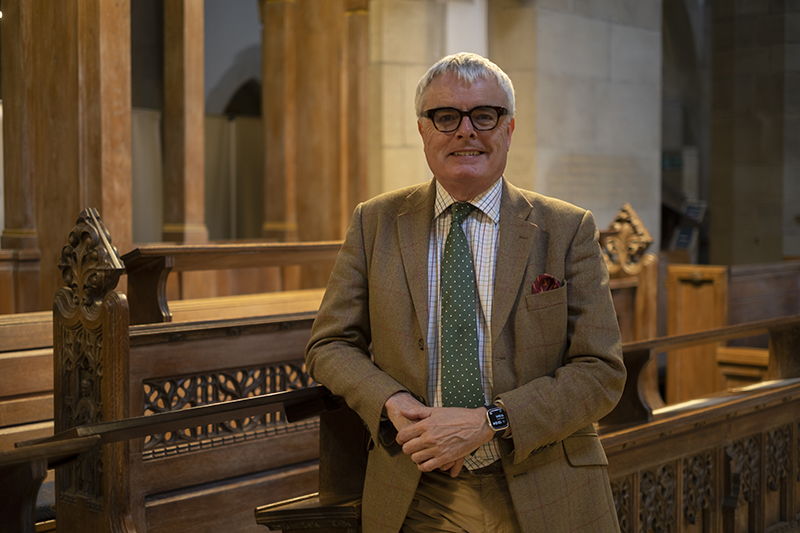On Wednesday 11th October we welcome Andrew Prior from London as our next organ recitalist. In this edition of ‘Notes from an Organist’ we discover more about him and the recital including playing a personal piece written by John Rutter; learning to fly; and how history is repeating itself when playing on our refurbished organ.
What can people expect from your recital at Bradford Cathedral?
I hope to provide a varied and entertaining recital full of colour and variety, exploring the recent works to the organ.
Could you introduce yourself, how you got into music / become an organist and your musical journey to where you are today?
I am Andrew Prior, and commenced organ studies at a very early age whilst a chorister in the local Church Choir. The organist gave me piano lessons and then allowed me to ‘have a go’ on the Church organ, and I haven’t looked back. I played for my Sister’s wedding at the age of 14, and happily the choir was directed by the then Director of Music of HM Chapel Royal, Hampton Court Palace who offered me an organ scholarship on the strength of my playing. The scholarship was an invaluable introduction to choral accompaniment and contributed to my successful application to Cambridge University and the Organ Scholarship at Pembroke College, where I read Music.
Why do you enjoy playing the organ?
It is such a distinct and varied instrument to play – be it a small chamber organ, or a large Cathedral organ such as you have at Bradford.
Do you have a particular favourite piece out of those you are playing?
Yes – Das Waalt mein Gott means a lot to me as it was written by my former Director of Studies, John Rutter in memory of my late wife, who encouraged me, on retirement, to pick up playing the organ again – with encouragement from your former Director of Music and my friend Alex Berry.
This recital season we are celebrating ‘Fanfares and Fireworks – Celebrating the Return of the Organ’. How are you weaving that theme into your recital?
The Reger Toccata and Fugue, with which I open my recital, is quite a dramatic combination of Fanfare and Fireworks with its fast scales and accelerando fugue which should demonstrate the extremes of the organ.
Are you looking forward to playing / hearing our refurbished organ?
Very much so – I attended the opening recital of the refurbished organ in 1977 when my friend John Scott played, and there is a certain and pleasing symmetry in playing in this series.
You last played a recital here in June 2021 – what have you been up to since then?
I have continued to enjoy playing recitals, but most dramatically is the news that I started flying lessons in January of this year, and now have my pilot’s licence!
You previously worked in law – did you enjoy that career?
I chose law because I realised that my musical contemporaries at Cambridge were on a different level to me, and pursued successful careers as soloists or Cathedral organists. I decided to keep music as a hobby, whilst pursuing a varied career firstly as a generalist, and then specialising in the defence of Local Authorities, ending my career as an officer of my local Council.
You are a trustee of the Orgelbuchlein Project – what’s the latest on this project?
The ‘missing gaps’ left by J.S. Bach in his Orgelbuchlein were completed with the final commission by John Rutter, and we are now working towards completing publication of the outstanding volumes of the collection and rolling out educational programmes associated with the commissions.
The John Rutter piece you are playing is connected to the project – could you tell us a little about it?
As mentioned above, it was written in memory of my late wife, Dee. She adored John’s music, and before becoming a Trustee of the project, the curator told me that John had been approached, but his work load was too great to contribute. I decided to have one more go with my late wife’s encouragement, and happily John agreed to compose the piece. Following her untimely death, he told me the whole ‘tenor’ of the piece had changed for him, and with the chorale melody he was asked to set, he felt the chorale was reminiscent of the English Tudor period rather than a North German ‘feel’. To this end, it is composed with Tudor references (which is why I offer the Gibbons piece to ‘set the mood’ before I play it) and the piece opens with three chords which spell D-E-E, the third chord having an E within a chord of A major – so ‘Dee and Andrew’.
Finally, how would you sum up your upcoming recital at Bradford Cathedral?
Simply as a joy to return for the third time and to experience the warmth of welcome.
You can join us on Wednesday 11th October 2023 at 1pm for Andrew Prior’s organ recital, with an optional £4 buffet lunch beforehand at 12:30pm.
You can discover more about our organ recital season on our dedicated page

